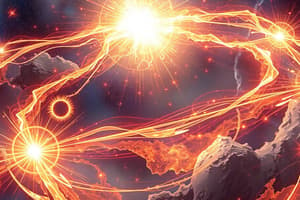Podcast
Questions and Answers
What is the strongest fundamental force, but acts over short ranges?
What is the strongest fundamental force, but acts over short ranges?
- Weak Nuclear Force
- Strong Nuclear Force (correct)
- Electromagnetic Force
- Gravitational Force
Which of Newton's laws states that an object in motion stays in motion unless acted upon by a net external force?
Which of Newton's laws states that an object in motion stays in motion unless acted upon by a net external force?
- Newton's Second Law
- Newton's First Law (correct)
- Newton's Law of Universal Gravitation
- Newton's Third Law
What is the formula for Kinetic Energy?
What is the formula for Kinetic Energy?
- KE = mv²
- KE = mgh
- KE = 1/2 mv² (correct)
- KE = 1/2 mv
What does Ohm's Law describe in electrical circuits?
What does Ohm's Law describe in electrical circuits?
Which type of energy is associated with an object's position?
Which type of energy is associated with an object's position?
Which law states that heat cannot spontaneously flow from a colder to a hotter body?
Which law states that heat cannot spontaneously flow from a colder to a hotter body?
What is the primary characteristic that distinguishes mechanical waves from electromagnetic waves?
What is the primary characteristic that distinguishes mechanical waves from electromagnetic waves?
What foundational concept introduces wave-particle duality?
What foundational concept introduces wave-particle duality?
Flashcards are hidden until you start studying
Study Notes
Key Concepts in Physics
Fundamental Forces
-
Gravitational Force
- Attraction between masses.
- Governs motion of celestial bodies.
-
Electromagnetic Force
- Acts between charged particles.
- Responsible for electricity and magnetism.
-
Weak Nuclear Force
- Responsible for radioactive decay.
- Operates at the subatomic level.
-
Strong Nuclear Force
- Holds protons and neutrons together in nuclei.
- Strongest force, but acts over short ranges.
Laws of Motion
-
Newton's First Law (Inertia)
- An object at rest stays at rest; an object in motion stays in motion unless acted on by a net external force.
-
Newton's Second Law (F=ma)
- The acceleration of an object is directly proportional to the net force acting on it and inversely proportional to its mass.
-
Newton's Third Law (Action-Reaction)
- For every action, there is an equal and opposite reaction.
Energy
-
Kinetic Energy (KE)
- Energy of a moving object, KE = 1/2 mv².
-
Potential Energy (PE)
- Energy stored due to position, PE = mgh for gravitational potential energy.
-
Conservation of Energy
- Energy cannot be created or destroyed, only transformed.
Thermodynamics
-
Zeroth Law
- If two systems are in thermal equilibrium with a third, they are in equilibrium with each other.
-
First Law (Conservation of Energy)
- Energy added to a system as heat minus work done by the system equals the change in internal energy.
-
Second Law
- Heat cannot spontaneously flow from a colder to a hotter body.
-
Third Law
- As temperature approaches absolute zero, the entropy of a perfect crystal approaches zero.
Waves and Oscillations
-
Wave Properties
- Wavelength, frequency, amplitude, speed.
-
Types of Waves
- Mechanical (requires medium) vs. Electromagnetic (does not require medium).
-
Harmonic Motion
- Repeated back-and-forth motion through an equilibrium position.
Electricity and Magnetism
-
Ohm's Law
- V = IR, where V is voltage, I is current, and R is resistance.
-
Magnetic Fields
- Produced by moving charges; affects other charges and currents.
-
Electromagnetic Induction
- The generation of electric current via a changing magnetic field.
Modern Physics
-
Quantum Mechanics
- Describes the behavior of particles at atomic and subatomic levels; introduces concepts like wave-particle duality.
-
Relativity
- Special relativity: laws of physics are the same for all observers; speed of light is constant.
- General relativity: gravity is the curvature of spacetime caused by mass.
Units of Measurement
- SI Units
- Mass: kilograms (kg)
- Length: meters (m)
- Time: seconds (s)
- Force: newtons (N)
- Energy: joules (J)
Measurement and Precision
-
Accuracy vs. Precision
- Accuracy: closeness to the true value.
- Precision: consistency of repeated measurements.
-
Significant Figures
- Reflects the precision of measurements; important in calculations.
Studying That Suits You
Use AI to generate personalized quizzes and flashcards to suit your learning preferences.




